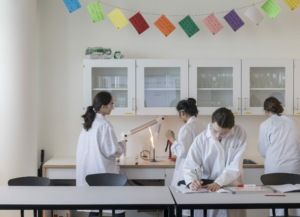News
Inquiry-based learning: from where many children’s future careers stem
This article is more than 4 years old.
How Copenhagen International School excels in the subjects of science, technology, engineering and maths

Science has never been this much fun (photo: CIS)
At Copenhagen International School, fun and learning are intertwined in order to grant the children the freedom to learn at their own pace.
The model of inquiry-based learning has helped the school to raise children in order to fight for a more sustainable and just world.
One of the areas Copenhagen International School excels in is teaching the subjects of STEM – science, technology, engineering and maths.
They thrive to create knowledge by letting the kids experiment and have fun in their learning process.
Two phases
Generally, the learning takes place in two phases.
In the first phase, the children are encouraged to make observations and draw their own conclusions.
The second allows them to further inquire according to their areas of interest.
Naturally, the teachers are leading the learning, but this method grants the children the freedom to shape their learning curve and develop critical thinking skills among others.
All about inquiry
Using the example of how third graders at Copenhagen International School learn about creating explosions by combining solids and liquids, we can truly get a glimpse at how exciting inquiry-based learning is.
There are different types of inquiries, and they determine the role of the student and the role of the teacher.
In a structured inquiry, the teacher sets the outcome as well as the procedure for the students. In the case of the explosion experiment, the teacher would say something along the lines of “Mix these liquids with these solids and see what your results are”.
Whereas, with guided inquiry, the question might still be formulated by the teacher, but the students design the procedure. Here, the teacher’s question would be along the lines of “Which powder-liquid combination creates the biggest explosion?” This is also leaving space for the students to ask more questions, which also makes the inquiry more open.
Real-life experiences
Continuing with the example of the third graders, this also showcases a vital approach Copenhagen International School has taken when educating future generations. Fun is and should be an integrated part of the learning process. This makes the children more engaged and consequently challenges them in a way in which they can feel rewarded and accomplished.
Fun also fosters community, which is a pivotal point of the values of Copenhagen International School. The students learning together will feel like they belong to a community, and even when they encounter the unknown, they know they are in it together. This is a crucial skill to learn for them as the future citizens of our world.
The STEM approach also facilitates fun learning in real-life contexts. Eighth-graders encounter a real-life scene from a surgery theatre when they are afforded the rare opportunity to dissect a heart or lungs. While seventh-graders are exposed to tasks such as investigating how to create sustainable packaging and reduce plastic waste at Christmas. Their suggestions have been sent to Magasin, proving the real-life relevance these methods have.
Bringing nature closer
Staying connected to real life also means being connected to nature and understanding it from a young age.
The magical campus at Nordhavn grants the kids an opportunity to observe nature at its finest. Using binoculars, they can watch as seagulls hatch their eggs just yards from their classrooms. This can then kick off a session regarding how and where the animals live in the wild.
This grants the opportunity to systematically teach the students about natural habitats, such as rainforests, savannahs and the ocean. By learning about all of these, they will be equipped to be the future citizens who actively work to protect these natural habitats of animals.
Understanding nature can be crucial in a historical context too. Second-graders are learning about dinosaurs and already reflecting on the concept of time. It is explained when these ‘magical’ creatures lived and how they became extinct. Through a realistic understanding, these students can grasp concepts such as meteoroids and other ancient creatures.
Sustainability is key
Learning STEM is crucial for children, and the unique way Copenhagen International School teaches it gives kids more than just knowledge – it could be the spark that puts them on their path to their future career.
The school is actively advocating that education is not just about jobs and positions, but educating children for the society of the future. Being prepared to be a citizen of the future will naturally grant them the possibility to be ready for future jobs.
But first and foremost, the goal is to create a just and sustainable world for all through the core values of Copenhagen International School. Teaching children the values of compassion, integrity, creativity, inclusion and growth will prepare them for the future and make sure they are successful in all walks of life.










































